Engender blog
All of Engender’s latest news. Reports, reviews, books, articles, and information from across Scotland’s women’s sector.
We would love to hear from other feminists around Scotland. Check out our guidelines for more information on how you can blog for us.
GUEST POST: Which women are visible in the Scottish Parliament?
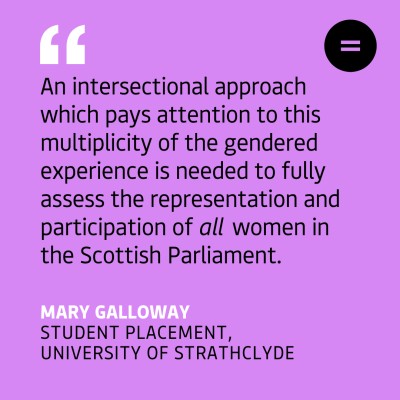 Today we're publishing the next blog in a series from the current student placements Engender is hosting from the University of Strathclyde Applied Gender Studies and Research Methods course.Following the local elections last week, it is clear that diverse representation is needed at all levels. Mary Galloway's research focuses on representation in the Scottish Parliament, and for her first post Mary maps out her research into the visibility of women with multiple marginalised identities, as well as discussing gender audits, and why an intersectional approach is needed in order to fully assess the representation and participation of all women in the Scottish Parliament. You can read Mary's second post here and third post here.
Today we're publishing the next blog in a series from the current student placements Engender is hosting from the University of Strathclyde Applied Gender Studies and Research Methods course.Following the local elections last week, it is clear that diverse representation is needed at all levels. Mary Galloway's research focuses on representation in the Scottish Parliament, and for her first post Mary maps out her research into the visibility of women with multiple marginalised identities, as well as discussing gender audits, and why an intersectional approach is needed in order to fully assess the representation and participation of all women in the Scottish Parliament. You can read Mary's second post here and third post here.In February 2022, it was announced that the Scottish Parliament will undergo a gender audit, something for which Engender, along with other organisations and campaigns, has long advocated. This audit will assess the extent to which women participate in and are represented by the Scottish Parliament, following the guide created by the Inter-Parliamentary Union. While a great start towards a gender-sensitive Parliament, there are clear limitations in what an audit can do to bring an intersectional lens to women’s representation. It is crucial that to truly explore gender equality, we need to uncover the experiences and positions of all women in Holyrood, including those of the most marginalised. The project I am carrying out here aims to provide a snapshot of the representation of the women in Scotland whose lives are structured and limited not just by their gender but by their race, physical and mental abilities, and sexuality too.
GUEST POST: Women’s Representation in the Scottish Local Council Elections 2022: What We Know So Far
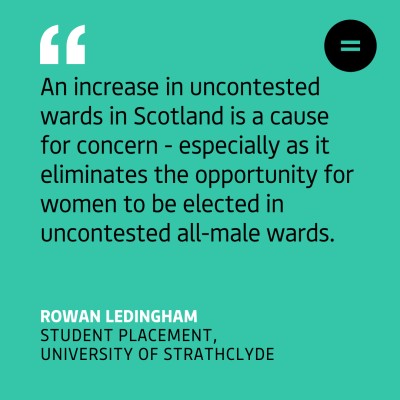
GUEST POST: Why we need diverse representation now
![A bright teal graphic with text: As a consequence of this [underrepresentation], local authorities across Scotland also have a limited understanding of tackling ethnic minority issues relating to housing, education, welfare, public sector employment and a whole host of additional engagement issues with their local communities.](/siteimages/Blog/resized/equal-rep-blog-cemvo-400.png) Between now and the local elections on May 5th, we will be publishing a series of blogs from the Equal Representation Coalition. They’ll be taking a look at the state of equality in our politics at the moment, discussing their work in tackle barriers to participation, and will be exploring the crucial role that accurate data plays in achieving equal representation in our councils and parliaments and why we need more of it. Here, Junaid Ashraf, Community Engagement Officer at CEMVO Scotland takes a look at some of the barriers faced by ethnic minority people entering politics, how these contribute to persistent underrepresentation in our councils and parliaments, and why it’s high time for change.
In the year 2022, CEMVO Scotland believes that society has accepted the argument that a democracy which is representative of the nation we live in is a good thing. We no longer subscribe to the idea that politics should be a career for the elite and those with aspirations to rub shoulders with the rich white men traditionally found in those circles.
Between now and the local elections on May 5th, we will be publishing a series of blogs from the Equal Representation Coalition. They’ll be taking a look at the state of equality in our politics at the moment, discussing their work in tackle barriers to participation, and will be exploring the crucial role that accurate data plays in achieving equal representation in our councils and parliaments and why we need more of it. Here, Junaid Ashraf, Community Engagement Officer at CEMVO Scotland takes a look at some of the barriers faced by ethnic minority people entering politics, how these contribute to persistent underrepresentation in our councils and parliaments, and why it’s high time for change.
In the year 2022, CEMVO Scotland believes that society has accepted the argument that a democracy which is representative of the nation we live in is a good thing. We no longer subscribe to the idea that politics should be a career for the elite and those with aspirations to rub shoulders with the rich white men traditionally found in those circles.We understand now that creating a diverse representative body can have a net positive impact on our lives as we seek to ensure that all experiences of Scotland are represented where the levers of power lie. Unfortunately, while we as a society might understand this, achieving it in reality is a much more difficult task, requiring decisive action from those already in power - including from councils, parliament and political parties.
GUEST POST: Precedented inequalities in unprecedented times
![Bright pink graphic that reads: "Stereotypical gender roles and wider social structures inform the ways in which they [women] are represented, scrutinised, and even obscured - this can be even more complicated for women who experience oppressions due to their race, sexuality, or other identities."](/siteimages/Blog/resized/student-blog-kirsty-2022-1080x1080-400.png) Here we've published the next in a series of blogs from the current student placements Engender is hosting from the University of Strathclyde Applied Gender Studies and Research Methods course.In this post, Kirsty Rorrison discusses the COVID-19 pandemic, from it's impact on women and minoritised communities to it's representation in the media, and introduces research specifically focusing on how gender bias in political news reporting has operated during the pandemic. You can read Kirsty's second post here.
Here we've published the next in a series of blogs from the current student placements Engender is hosting from the University of Strathclyde Applied Gender Studies and Research Methods course.In this post, Kirsty Rorrison discusses the COVID-19 pandemic, from it's impact on women and minoritised communities to it's representation in the media, and introduces research specifically focusing on how gender bias in political news reporting has operated during the pandemic. You can read Kirsty's second post here.With the COVID-19 pandemic recently passing its two year anniversary, I’m sure many of us have been reflecting on the ways in which life has changed since the coronavirus first became a mainstream issue. We have all been impacted by the pandemic in one way or another - circumstances have changed personally, socially, politically and economically all across the world. However, while it may seem like everything in our society has fundamentally shifted, its underlying social structures have remained practically untouched. In fact, the COVID-19 pandemic can be seen as something of a magnifying glass for the oppressive social institutions forming the bedrock of modern society. In these "unprecedented times,” some things have reflected the precedent more than ever.
Scottish charities ‘seriously concerned’ about ‘light-touch’ Scottish Government plans to reform equality rules for public bodies
-400.png)
GUEST POST: Divorce and Women’s Rights in Scottish History
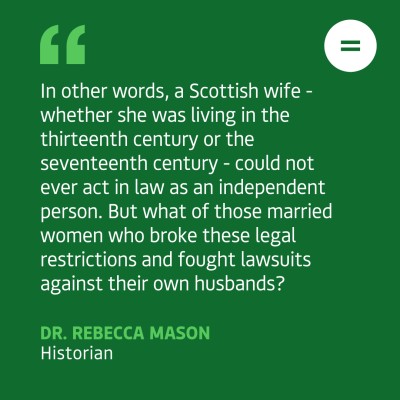 Dr Rebecca Mason is a historian whose work focuses on Scottish legal and social history, and women’s legal rights. She is currently writing a book on ordinary women’s navigation of legal systems and property relationships in early modern Scotland. In this blog, Dr Mason explores the complex history of divorce law in Scotland in the context of married women’s rights.
On April 6 2022, divorce law in England and Wales will significantly change following the introduction of “no-fault” divorce. This means that separating couples in England and Wales will now be able to get a divorce, civil partnership dissolution or legal separation without having to assign blame to either party for the breakdown of their relationship.
Dr Rebecca Mason is a historian whose work focuses on Scottish legal and social history, and women’s legal rights. She is currently writing a book on ordinary women’s navigation of legal systems and property relationships in early modern Scotland. In this blog, Dr Mason explores the complex history of divorce law in Scotland in the context of married women’s rights.
On April 6 2022, divorce law in England and Wales will significantly change following the introduction of “no-fault” divorce. This means that separating couples in England and Wales will now be able to get a divorce, civil partnership dissolution or legal separation without having to assign blame to either party for the breakdown of their relationship.For centuries, nothing determined a Scottish woman’s identity more than her marital status. For a woman living in Scotland during the sixteenth century, her legal rights were inextricably connected to her relationship to a man: as a daughter to a father, a wife to a husband, or a widow to a former husband. Whether a woman was single, married, or widowed greatly defined her legal, social and economic opportunities during a time when men’s laws ruled women’s lives.
GUEST POST: Women and Local Council Elections in Scotland
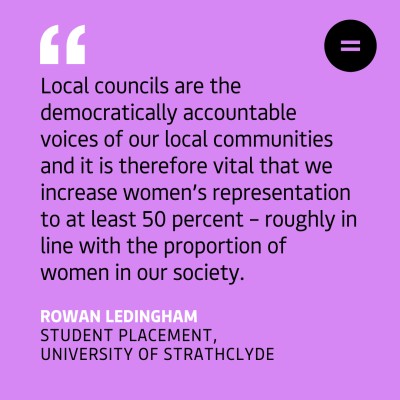 Today we're publishing the first in a series of blogs from the current student placements Engender is hosting from the University of Strathclyde Applied Gender Studies and Research Methods course. In this post, Rowan discusses women's representation in local councils, and will be researching about why some women that were previously elected are not re-standing in the local council elections in May 2022. You can read Rowan's second blog here.
Today we're publishing the first in a series of blogs from the current student placements Engender is hosting from the University of Strathclyde Applied Gender Studies and Research Methods course. In this post, Rowan discusses women's representation in local councils, and will be researching about why some women that were previously elected are not re-standing in the local council elections in May 2022. You can read Rowan's second blog here. When I decided to apply to the Applied Gender Studies masters at Strathclyde, the prospect of a research placement at Engender was a big factor in my decision. Naturally, I am now thrilled to be a part of this organisation’s research into the experiences of female local councillors in Scotland and the reasons behind some women’s decision to stand down in the May 2022 elections.
Data & Equality in Politics
Between now and the local elections on May 5th, we will be publishing a series of blogs from the Equal Representation Coalition. They’ll be taking a look at the state of equality in our politics at the moment, discussing their work in tackle barriers to participation, and will be exploring the crucial role that accurate data plays in achieving equal representation in our councils and parliaments and why we need more of it. Here, Engender’s Equal Representation Development Officer Jessie Duncan is kicking us off with an introduction to some of the key issues and why gathering data is vital to achieving equal representation.
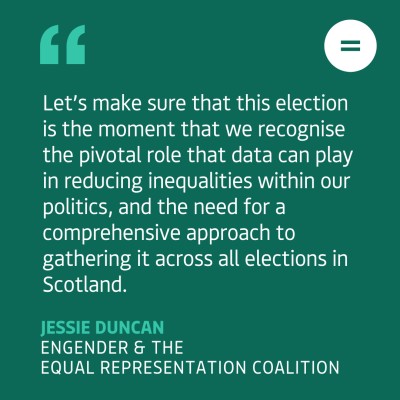
BAFTAs so...diverse?
Awards season is upon us: the 2022 ceremony for the British Film and Television Awards (the BAFTAs) took place on the 13th of March, and the Academy Awards are coming up fast. As always, with awards-fever comes discussions of representation, and in this blog, Dr Miranda Barty-Taylor reflects on the changes we have seen to the BAFTA awards, and whether they are enough to bring about women's equality in the arts.
-400.png)
Trapped: the call for a more flexible world
Fran Macilvey is an Edinburgh-based author. Her memoir ‘Trapped’ tells the story of her life with cerebral palsy. She has also published two self-help books which she thinks of as ‘gleaning something valuable from forty years of making mistakes’ and has recently finished writing three novels about women’s experiences with the law.
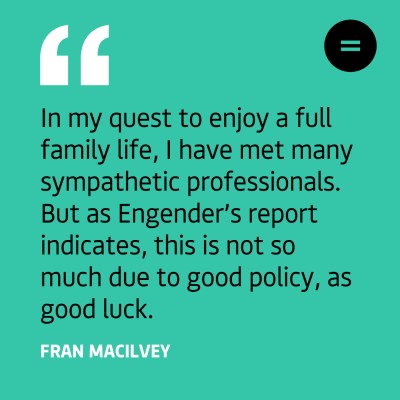
Using the law to tackle misogyny
Engender’s Policy and Parliamentary Manager, Eilidh Dickson, has been a member of the Independent Working Group on Misogyny chaired by Baroness Helena Kennedy. Here she reflects on the final report released today: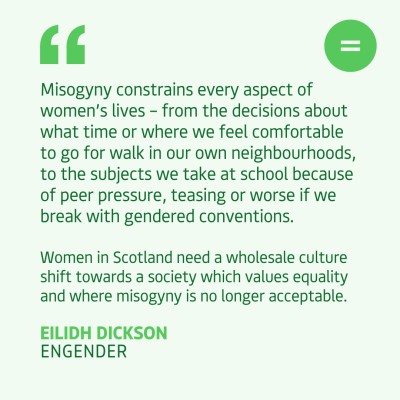
Misogyny constrains every aspect of women’s lives – from the decisions about what time or where we feel comfortable to go for walk in our own neighbourhoods, to the subjects we take at school because of peer pressure, teasing or worse if we break with gendered conventions. Women in Scotland need a wholesale culture shift towards a society which values equality and where misogyny is no longer acceptable. For a number of years Engender has been calling for a standalone criminal offence based on misogyny; using the law as one piece of the puzzle to making women safer in Scotland.
Downloads
 Engender Briefing: Pension Credit Entitlement Changes
From 15 May 2019, new changes will be introduced which will require couples where one partner has reached state pension age and one has not (‘mixed age couples’) to claim universal credit (UC) instead of Pension Credit.
Engender Briefing: Pension Credit Entitlement Changes
From 15 May 2019, new changes will be introduced which will require couples where one partner has reached state pension age and one has not (‘mixed age couples’) to claim universal credit (UC) instead of Pension Credit.
 Engender Parliamentary Briefing: Condemnation of Misogyny, Racism, Harassment and Sexism
Engender welcomes this Scottish Parliament Debate on Condemnation of Misogyny, Racism, Harassment and Sexism and the opportunity to raise awareness of the ways in which women in Scotland’s inequality contributes to gender-based violence.
Engender Parliamentary Briefing: Condemnation of Misogyny, Racism, Harassment and Sexism
Engender welcomes this Scottish Parliament Debate on Condemnation of Misogyny, Racism, Harassment and Sexism and the opportunity to raise awareness of the ways in which women in Scotland’s inequality contributes to gender-based violence.
 Gender Matters in Social Security: Individual Payments of Universal Credit
A paper calling on the Scottish Government to automatically split payments of Universal Credit between couples, once this power is devolved to the Scottish Parliament.
Gender Matters in Social Security: Individual Payments of Universal Credit
A paper calling on the Scottish Government to automatically split payments of Universal Credit between couples, once this power is devolved to the Scottish Parliament.
 Gender Matters Manifesto: Twenty for 2016
This manifesto sets out measures that, with political will, can be taken over the next parliamentary term in pursuit of these goals.
Gender Matters Manifesto: Twenty for 2016
This manifesto sets out measures that, with political will, can be taken over the next parliamentary term in pursuit of these goals.
 Scottish NGO Briefing for UN Special Rapporteur on Violence Against Women
Joint briefing paper for the UN Rapporteur on Violence Against Women.
Scottish NGO Briefing for UN Special Rapporteur on Violence Against Women
Joint briefing paper for the UN Rapporteur on Violence Against Women.

Newsletter
Sign up to receive our newsletter here:
Sign up to our mailing list
Receive key feminist updates direct to your inbox:
-400.png)
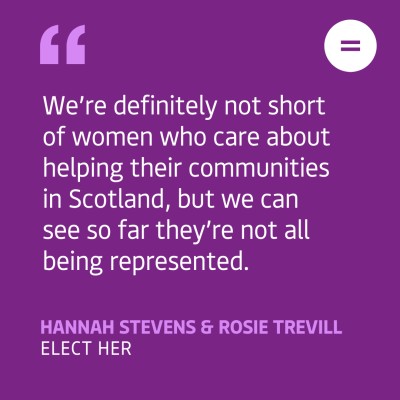
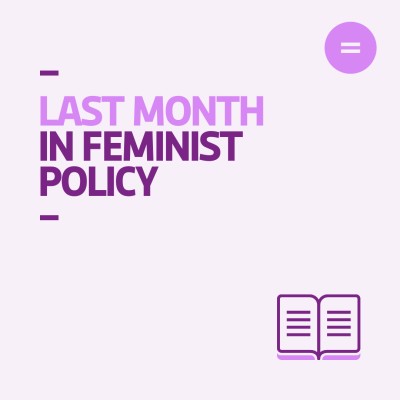
-400.png)
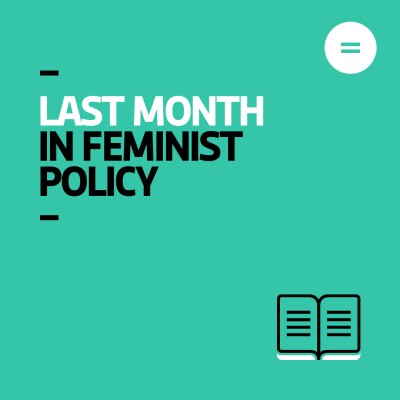
-400.png)
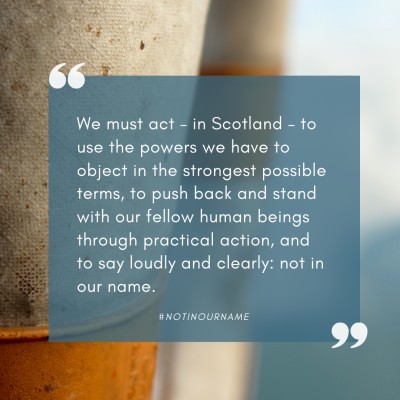
-400.png)
-400.png)